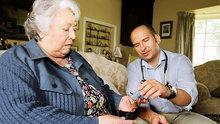Found 355 resources.
0
0
0
Emerging health care financing models require much more sophisticated actuarial calculations than previous payment arrangements, often taking into account risk factors such as homelessness. Homelessness also has direct implications for clinical treatment decisions and integrated care models and should be noted in individual patient records. This policy brief provides a rationale for using the ICD-10-CM code for homelessness, outlines the challenges to maximizing this code, and offers strategies to consider to ensure health care providers ask about homelessness and record patients’ housing...
Topics: Health, Homelessness, Housing, Legislation & Policy, Low-income, Medicaid / Medicare
0
0
0
As the population ages, one of the greatest challenges facing state officials is how to organize and pay for long-term services and supports (LTSS) for low-income elderly and disabled adults—the most complex, expensive, and fastest-growing group covered by Medicaid. To help address this challenge, a toolkit for state leaders published in 2017 has been updated.
Topics: Disabilities, Health, Low-income, Medicaid / Medicare, Partnerships, Seniors
 Shared by Housing Is
on Mar 26, 2019
Shared by Housing Is
on Mar 26, 2019 0
0
0
With different drivers but a shared set of goals, public health, health care, social services, and other sectors can come together to work upstream and develop creative solutions to solve the complex problems facing communities today. To that end, with funding from the Robert Wood Johnson, the Public Health National Center for Innovations and the Center for Sharing Public Health Services partnered to launch the Cross-sector Innovation Initiative (CSII). The goal of the CSII is to support, promote and disseminate learning about the role of governmental public health departments in aligning...
Topics: Data sharing, Health, Partnerships, Research
 Shared by Housing Is
on Mar 19, 2019
Shared by Housing Is
on Mar 19, 2019 0
0
0
After working with 37 communities across the country over the last three years to drive sustainable improvements in community health we’ve we’ve seen how when specific approaches are implemented, namely Bold, Upstream, Integrated, Local, and Data-Driven approaches, meaningful change affecting the health of a community can happen. We’ve done our best to document the processes, the successes, and the failures along the way, and from those real-world experiences we’ve created a set of preliminary tools that can inform and guide those interested in learning about the unique BUILD approach.
Topics: Community development, Data sharing, Health, Partnerships
 Shared by Housing Is
on Mar 19, 2019
Shared by Housing Is
on Mar 19, 2019 0
0
0
This episode features two guests from the University of Chicago—Dr. Julia Koschinsky, the Executive Director for the Center for Spatial Data Science, and Dr. Nicole Marwell, an Associate Professor in the School of Social Service Administration. They are leading a project, funded by the Public Health National Center for Innovations (PHNCI), which is analyzing data on geographic access to health and human services to help government officials address gaps and maximize the impact of existing resources. The project will offer a replicable framework and tool for analyzing and improving...
Topics: Data sharing, Health, Midwest, Research
 Shared by Housing Is
on Mar 19, 2019
Shared by Housing Is
on Mar 19, 2019 0
0
0

Asset-based community development (ABCD) is a large and growing movement that considers local assets as the primary building blocks of community development, social capital, and health and well-being. Ron Dwyer-Voss, MA, the Owner of Pacific Community Solutions, who also happens to be a long-time friend of podcast host Peter Eckart, joined the show to discuss how ABCD draws on existing strengths of local residents, associations, and institutions to build stronger, healthier, and more sustainable communities. He shared strategies, tools, and examples of how ABCD can be used to engage community...
Topics: Asset building, Community development, Health, Partnerships
 Shared by Housing Is
on Mar 19, 2019
Shared by Housing Is
on Mar 19, 2019 0
0
0

Universal meals allow schools to build the program into their overall curriculum, "creating a learning lab for healthy eating and a mealtime experience where every kid is equal and enjoys their meals together," according to Hunger Free Vermont, which says nearly a quarter of schools in the state offer them and studies show that the programs "increase participation, leading to better student health and learning, and a strong school meals business. When participation is up, school meal programs have more resources to invest in even higher quality food, including many local foods...
Topics: Child welfare, Education, Food insecurity, Funding, Health, Nutrition
 Shared by Housing Is
on Mar 19, 2019
Shared by Housing Is
on Mar 19, 2019 0
0
0
As of 2015, the Centers for Medicare & Medicaid Services (CMS) pays for chronic care management (CCM) services for Medicare beneficiaries with two or more chronic conditions. CMS requires eligible providers to first obtain patients’ verbal (and, prior to 2017, written) consent, to ensure that patients who participate in CCM services understand their rights and agree to any applicable cost sharing. CCM providers must also enhance patients’ access to continuous and coordinated care, including ongoing care management.
Topics: Health, Low-income, Medicaid / Medicare, Research
 Shared by Housing Is
on Mar 18, 2019
Shared by Housing Is
on Mar 18, 2019 0
0
0
The Supplemental Security Income (SSI) program is an important, means-tested source of income for the families of children with disabilities. Although some research has shown that SSI improves outcomes for these families, policymakers have been concerned about the program’s growth and the poor outcomes that many former child SSI recipients experience in adulthood. In this brief, we summarize research funded by SSA’s Disability Resource Consortium (DRC) on the program’s recent growth and the factors related to receipt of SSI by children. This research reveals dramatic variation in the rate of...
Topics: Child welfare, Disabilities, Health, Low-income, Research
 Shared by Housing Is
on Mar 18, 2019
Shared by Housing Is
on Mar 18, 2019 0
0
0
This brief presents a new approach to support the development of early math skills in young children. The approach synthesizes the influence of parents, home environment, and children’s health care providers. The brief draws on research to explain (1) why it is important to support early math development, (2) what early math is (and isn’t), (3) how early math and literacy development intertwine, and (4) the important role parents play in their child’s development. The brief ends with a description of a promising approach to support early childhood math development that leverages communication...
Topics: Child welfare, Early childhood, Education, Health, Literacy, Partnerships
 Shared by Housing Is
on Mar 18, 2019
Shared by Housing Is
on Mar 18, 2019 0
0
0

With persistent concerns about health care expenditures, the health care field has recognized a group of patients known as super utilizers—people with complex health needs and socioeconomic challenges who have very high levels of hospital use. A well-publicized team-based care management model to address the needs of these patients is the hotspotting model pioneered by the Camden Coalition of Healthcare Providers in New Jersey, first brought to national attention by an article in the New Yorker in 2011. So far, interest in programs to help super utilizers has outpaced the available evidence...
Topics: Health, Low-income, Medicaid / Medicare, Research
 Shared by Housing Is
on Mar 18, 2019
Shared by Housing Is
on Mar 18, 2019 0
0
0
Strengthening primary care is critical to promoting health and reducing costs in the United States. Comprehensive Primary Care Plus, or CPC+, is an advanced alternative payment model for primary care that builds on the foundation of the Comprehensive Primary Care initiative, implemented by the Center for Medicare & Medicaid Innovation from 2012 through 2016. The evaluation is assessing whether CPC+ achieves improved quality, reduced expenditures, and better health for Medicare and Medicaid beneficiaries in thousands of primary care practices using a mixed methods study. We are analyzing...
Topics: Health, Medicaid / Medicare, Research
 Shared by Housing Is
on Mar 18, 2019
Shared by Housing Is
on Mar 18, 2019 0
0
0

The proposed bill follows an NBC News investigation that found at least 11 public housing residents had died of carbon monoxide poisoning since 2003.
Topics: Funding, Health, Housing, Legislation & Policy, Safety
0
0
0

Kaiser is investing $200 million in low-interest loans for affordable housing nationwide. This may be part of a growing national trend of health maintenance organizations investing in housing to improve community health. In Phoenix, United Healthcare lent money to a community development corporation, Chicanos Por La Causa, to purchase apartment complexes for Medicaid recipients. In Chicago, the University of Illinois Hospital helps to find permanent housing for homeless people who regularly present at its emergency department.
Topics: Affordable Care Act, Community development, Health, Homelessness, Housing, Low-income, Partnerships, West Coast
0
0
0
Housing is considered a social determinant of health, with poor housing conditions being associated with poor health. Veterans with disabilities are more likely to experience a housing crisis because of combat experiences and employment instability. We identified facilitators and barriers to finding and maintaining rental housing. We sought to understand the housing needs of Veterans with military-related disabilities using the biopsychoecological model (BEM) as an organizing framework.
Topics: Disabilities, Funding, Health, Homelessness, Housing, Legislation & Policy, Research, Safety, Seniors, Stability
 Shared by Housing Is
on Mar 14, 2019
Shared by Housing Is
on Mar 14, 2019 0
0
0
Vacant properties, substandard housing, and neighborhood quality profoundly affect our health, education, and safety. Strategic code enforcement programs can serve as communities’ first line of defense for addressing deteriorating homes, vacant properties, and neighborhood decline. Strategic code enforcement programs organize critical assets, resources, and actions into a dynamic and adaptive system.
Topics: Community development, Data sharing, Funding, Health, Legislation & Policy, Partnerships
 Shared by Housing Is
on Mar 14, 2019
Shared by Housing Is
on Mar 14, 2019 0
0
0
On behalf of All In: Data for Community Health, Data Across Sectors for Health (DASH) is conducting The 2019 National Inventory of Data Sharing Collaborations for Health to better understand the location and nature of multi-sector collaborations in the United States, their capacity for data-sharing to improve health, and to assess progress in this field among multi-sector collaborations. Your participation in The National Inventory will also help us identify areas for further learning and opportunities to support and expand these activities. All In: Data for Community Health is a learning...
Topics: Data sharing, Health, Partnerships, Research
 Shared by Housing Is
on Mar 13, 2019
Shared by Housing Is
on Mar 13, 2019 0
0
0

We beef up law enforcement to attack crime, devote more funding to try and improve inadequate schools and tackle health disparities by getting more people to the doctor. But what if Baltimore could solve all of its persistent social problems by getting rid of poverty?
Topics: Asset building, Criminal justice, Funding, Health, Legislation & Policy, Low-income, Mental health
 Shared by Housing Is
on Mar 11, 2019
Shared by Housing Is
on Mar 11, 2019 0
0
0

A new study measured the mental health of Philadelphia residents before and after blighted lots had been converted into green spaces.
Topics: Community development, Health, Mental health, Place-based, Research
 Shared by Housing Is
on Mar 11, 2019
Shared by Housing Is
on Mar 11, 2019 0
0
0

Healthy Housing for All: How Affordable Housing is Leading the Way explores the affordable housing industry’s achievements in creating healthier housing environments and translates them into lessons for the broader housing marketplace. The innovations in healthy affordable housing present an opportunity to replicate healthy housing successes, as well as to respond to market demand across the residential development industry.
Topics: Health, Housing, Legislation & Policy, Research
 Shared by Housing Is
on Mar 11, 2019
Shared by Housing Is
on Mar 11, 2019 0
0
0

When children get sick from poor living conditions inside their rundown apartments, they miss school. And when 95 percent of students of one school live in the same apartment complex—where evictions are routine and black mold is rampant—classrooms are often left empty.
Topics: Attendance, Child welfare, Education, Health, Housing, Low-income, Partnerships, Place-based, Youth
 Shared by Housing Is
on Mar 11, 2019
Shared by Housing Is
on Mar 11, 2019 0
0
0

In 2016, the health system teamed with Spartanburg Community College and the National Center for Construction Education and Research, a nonprofit that provides global training and certification. Together, the three entities began offering construction skills training to area residents.
Topics: Asset building, Health, Low-income, Partnerships, Workforce development
 Shared by Housing Is
on Mar 11, 2019
Shared by Housing Is
on Mar 11, 2019 0
0
0

Why would a healthcare system get involved in the issue of affordable housing? Or play a critical role in establishing an affordable, high-quality preschool? That’s exactly what AdventHealth is doing in a partnership with the residents of the Communities of West Lakes in Orlando. They are just one of several healthcare industry partners investing in this neighborhood that houses some of their most frequent customers.
Topics: Health, Housing, Partnerships
 Shared by Housing Is
on Mar 11, 2019
Shared by Housing Is
on Mar 11, 2019 0
0
0

Typhus, tuberculosis, and other illnesses are spreading quickly through camps and shelters.
Topics: Health, Homelessness, Housing, Low-income, West Coast
 Shared by Housing Is
on Mar 8, 2019
Shared by Housing Is
on Mar 8, 2019 0
0
0

The number of kids enrolled in Medicaid and the Children’s Health Insurance Program (CHIP) — two government health plans for the poor — fell by nearly 600,000 in the first 11 months of 2018, a precipitous drop that has puzzled and alarmed many health policy analysts, while several states say it reflects the good news of an improving economy.
Topics: Affordable Care Act, Child welfare, Early childhood, Health, Legislation & Policy, Low-income, Medicaid / Medicare, Research, Youth
 Shared by Housing Is
on Mar 8, 2019
Shared by Housing Is
on Mar 8, 2019 